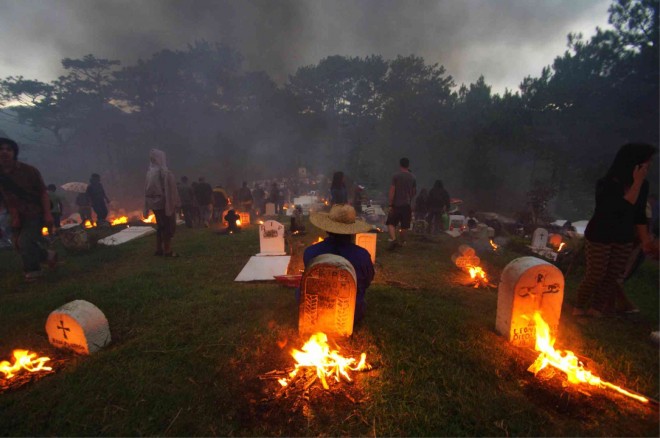
DAY OF THE DEAD In the tourist town of Sagada in Mt. Province, residents make bonfires, using “saleng” (pine resin wood), near the tombs of their loved ones as the sun sets on All Saints’ Day. Locals believe that the fire from burning saleng will provide light and warmth to the souls of their dead. Village folk in Sagada also perform the all-occasion ritual “senga” when a community member dies. RICHARD BALONGLONG
Walikan Tan-ang died a few years ago at the age of over 100, one of the oldest residents of Kibungan town in Benguet province. Having reached such age, the family and the community would not be grieving but celebrating a life well lived.
Still, there was the concern of giving Tan-ang a decent burial as required by the Kankanaey community’s tradition because by its standards, he might be considered a pauper. So how could the family afford a decent burial where the old man had to be given at least a five-day wake with all the required rituals, including slaughtering pigs?
But Tan-ang was fortunate to be in a community where the cost of death was a collective and shared responsibility. Kibungan is an upland Benguet town of almost 17,000 people.
A vital element of this community tradition is what Kankanaey folk call deng-ao or deng-aw. This is an old practice where each family contributes in kind or in cash to the cost of burial and its accompanying rites.
So when someone dies, each member of the neighborhood or the community volunteers to help out in what the wake and burial require. There would be community members who would consult with the dead’s family and—with the advice of an elder—be ready to volunteer for errands.
For example, some community members would look for pigs if the family of the dead does not have pigs or even if the family keeps some but not enough for the duration of the wake and burial.
The neighbor who has a pig would immediately offer the animal, which would be paid after the gutod. Gutod is the accounting of all expenses during the wake and burial and the accounting of all cash contributed as part of the deng-ao.
The gutod is done either immediately after the burial or a week or two later.
In most cases, deng-ao cash contributions would be enough, if not even more than enough, to pay off the expenses, which would include not only the animals butchered and food and drinks but also the traditional blankets.
Solidarity
The cash contributions could range from as little as P20 to as much as P1,000, depending on what a community member could afford. And all contributions, no matter how small, are a significant part of solidarity.
The rest may not be able to give cash but can volunteer time and effort. Some gather firewood, prepare the coffin, bring camote (sweet potato), pound rice, and cook food for the wake and burial.
Those who happen to be out of town because of their jobs would, as part of community responsibility and solidarity, send their contributions through relatives.
Some have learned to tap the public service programs of local radio stations to announce the death and burial of relatives. Others would post about the death on social networking sites so relatives from out of town or overseas could find a way to send their contributions.
For some families, the close relatives of the dead would offer to contribute more. Besides their deng-ao contributions, close relatives would volunteer to shoulder other expenses, such as the cost of a pig or traditional blankets worn by the dead. These handwoven traditional blankets cost thousands of pesos.
Collective burden
Since it is a shared and collective burden for the community, death becomes less painful.
When Tan-ang died, the deng-ao contributions turned out to be enough to pay off the costs of the wake and burial. This left the bereaved family debt-free.
Small wonder in such a community, its members would rejoice even amid death.
During Tan-ang’s wake, for example, some elders, in between baya-o or traditional dirges, recalled with fondness how he used to be a good hitter in baseball games and a billiards player despite a slight physical defect. Tan-ang could not fully stretch his arms, an inborn physical condition.
If a community member died of a tragic incident, such as a road accident, the outpouring of support from the community is significant to help ease the pain and sorrow. The bereaved family’s pain becomes the whole community’s burden.